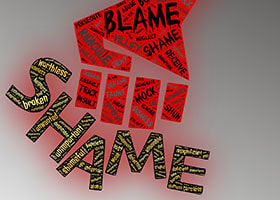 Spirituality is a source of comfort, guidance, meaning and purpose for many people. However, for many survivors of domestic violence, misguided religious messages can be used to justify abuse and coerce victims to submit and accept maltreatment, coercion, cruelty, neglect and/or violence. Spiritual abuse is an insidious form of trauma and psychological manipulation that uses religious doctrine to control community members and keep them subjugated. When spiritually toxic environments intersect with domestic violence, often scripture is used to embolden abusers. Often times, scripture that alludes to women being required by God to be submissive or “fulfill their wifely duties” is used to force victims – women especially – to submit to their abuser. Worse yet, many survivors who report their abuse to practicing family or community members, are often turned away and told to “pray, submit, and be a good wife.” This is a powerful form of victim blaming and makes leaving a domestically violent relationship that much more heartbreaking.
0 Comments
By Sybil Cummin, MA, LPC, ACS (If you are in an unsafe relationship, please take caution in where you keep this article or any of the activities completed based on this article. Please reach out to your local advocacy center if you need help with safety).  There are many beliefs about the power of forgiveness and the necessity to do so if you want to heal. You might receive the advice that if you do not forgive your abuser, then it will forever eat you up inside. The thought of forgiving the person that tore you down, gave you bruises, made you doubt your own reality, threatened to take away your children (or maybe even succeeded) and did so willfully is sickening to you. If you are still experiencing forms of abuse even after separation, how do you forgive someone of past hurts, when they are not in the past at all? The abuse is current. So, is forgiveness of your abuser a mandatory part of healing? In my work with victims and survivors of Intimate Partner Violence (IPV) and survivors of sexual abuse, forgiveness as it is typically defined does not seem to be a necessary step of the healing process. There are two processes on your healing journey that relate to forgiveness that are truly helpful, and for the clients I have worked with an integral part of the healing process. The first is an understanding of the abuse and your abuser. Second, and probably holds the most power in your healing journey, is forgiveness of yourself. By Sybil Cummin, MA, LPC (If you are in an unsafe relationship, please take caution in where you keep this article or any of the activities completed based on this article. Please reach out to your local advocacy center if you need help with safety).  Do you find yourself feeling guilty for everything in your relationship? Does everything feel like it is your fault or are you made to believe all your relationship problems are your fault? This tactic is a very common one with in abusive relationships and is one that can keep you hooked into staying for a long time. How can you determine if the fault and responsibility for the problems in your relationship are yours to carry and how can you discard these feelings to gain a true perspective on your relationship? Are you really feeling guilt or is it something different all together? I think that it is important to look at what the term “guilt” truly means and how it can be helpful or harmful to our self-worth and mental health. Guilt can be identified as a feeling when we have done something that goes against our values or when we have done something “wrong.” |
AuthorSybil Cummin, MA, LPC, ACS Archives
February 2021
Categories
All
|
